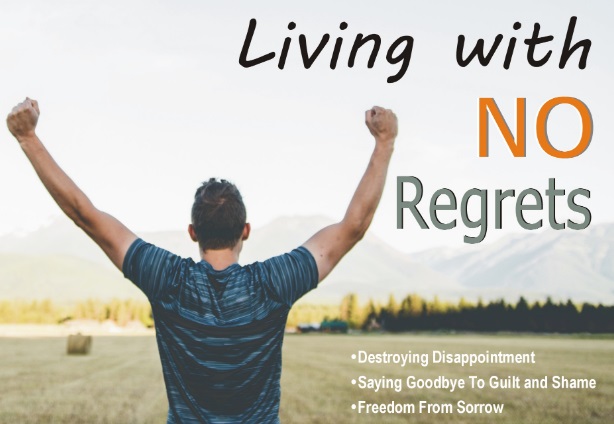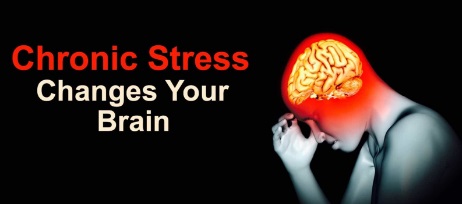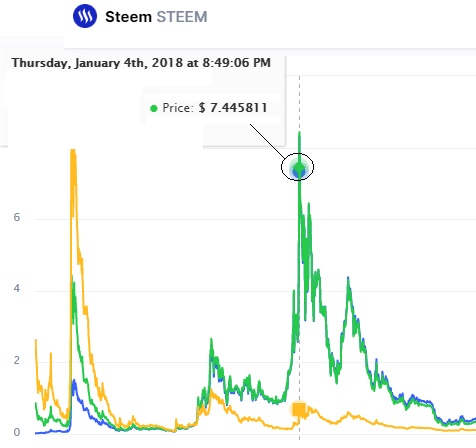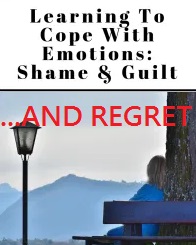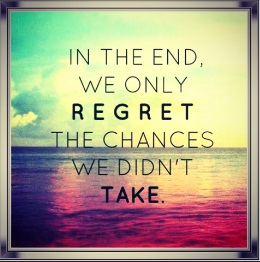The psychology of regret -.... denial, projection and unhappiness.
If we truly live in the moment, regret then becomes an ‘impossible emotion’ - by definition.
It can only ever be experienced by looking back in time – and by doing that, it comes a multitude of negative possibilities, both mentality and physically.
We can learn valuable lessons by analyzing our past behaviors , choices, and the consequences resulting from those choices.
This 'retrospective analyzing' can stand us in good stead, thus giving us new tools.
these are mental tools, ones that we’ve acquired - from experience - to inform and help make better choices in the future_.
The problems arise when it becomes a default state of mind.
...which, in turn, makes a potentially healthy activity, into a very negative one.
The problems with forever analyzing the past, is that not only do you miss spending that time in the present – it can become habit forming.
This 'habitually regretting' perspective is normally rooted in other issues. (habitual regret being just one symptom of many expression of other, deeper, underlying issues).
Firstly we need to define what regret is.
Regret is a negative cognitive or emotional state which involves blaming ourselves - for whatever bad outcome arises. This can be an expression weak ego (formed in childhood), which can then expresses as low self esteem as an adult.
Guilt and shame are always in attendance, if silent.
Passive aggressive behaviors are also a common trait of those suffering with self esteem issues.
With regret, comes the feelings of loss (or sadness).
With that feeling of regret , then comes ruminations of ‘ what might have been’, and a berating of ones' self - i.e a lamenting about the choices that we’ve made.
The psychological pain of regret, if the person is not very self aware - can express itself through projection.
(Projection is the process of displacing one’s own feelings onto a different person, often being unaware of what’s actually taking place).
When combined with the unfortunate elements of weak ego development, (low self esteem) it often expresses itself through passive aggressive actions - and being very judgmental with others.
If regret becomes a ‘default’ behavioral pattern, the more likely it becomes that regret can turn into severe self loathing, and is even capable of triggering chronic stress.
This type of long term constant stress damages both the mind, and the body.
Obesity, lack of quality sleep, and a reduced immune system (and reduced cognitive function), are just some of many ailments – all caused by living negatively in the past !
Over shorter time periods, people are more likely to regret actions taken and the mistakes they've made (action), but, over longer time periods , people with regret are far more likely to regret actions that were not taken.
Research that’s been carried out, has put ‘working too hard’ and ‘not spending enough time with family’ as two of the main non actions taken.
Projection (being judgmental with others) , will often occur on those that appear to not to have the same regret issues.
This is both envy and resentment. (see my earlier #deepdives posts on the discussion of envy and resentment).
They are envious of not being able to inhabit the ‘happy go lucky mindset’, and then ,resenting that happiness that they see in others.
it's a state of mind that they themselves find difficult to achieve. (because they are unaware, they are oblivious to the fact that it’s their own mindset that’s actually causing the inability to be truly happy ).
This pattern of repetitive, negative, and self focused, thinking, is also characteristic of clinical depression.
Regret can cause such an intense degree of self-recrimination, that if left unchecked (unresolved) can result in suicide.
Regret also impedes the ability to recover from any stressful events in your life.
I saw a post recently that exhibited all the pathology of someone living in the past -complete with the attached projections and the judging of others.
They’d passed up (inaction) on the opportunity to live debt free (for life).
By not cashing in on the massive hike in steem prices a few years ago, this deep regret is projected onto others - On those that did cash in.
They're trying to cope with the psychological pain of regret, the pain of of their own inaction.
By projecting onto others the notion that those who cashed in will 'regret that action' they deflect the painful exercise of looking into themselves.
The underlying issues have not been addressed, and cannot even conceive of people taking the action, and then having no regrets for the decision.
I'm a good example of the 'they' people that the author talks about.
My mindset of not regretting, is simply inconceivable to the 'regret psychology'.
I regret nothing.
Whatever the price of HIVE goes to (or not), changes nothing in respect to my own perspectives on life .
I'm happy, whatever happens.
Advertisers harness the power of regret...
They do this by preying directly on those with regret issues.
They are the consumers with low self control.
By applying the emotion of guilt for not taking a purchasing action, ( they would be ‘missing out’), those with issues of regret can become easy targets.
Interestingly, the projection of blame onto adverting and 'the evil capitalists' vitriol that is often seen - in those with regret issues. (the victim mentality becomes apparent , as it's always someone else's fault - for them buying a product!).
“Oh, why didn’t I buy that health insurance before I became ill”
(for example)
... it’s very easy to see for those of us that are not living with these issues, BUT for those that are living in that grey, unhappy world, they’re entirely oblivious to the mind games that are being played out upon them.
‘I could have’,
‘I should have’,
‘I only wish that I'd..’
‘if only I’d…’
These are all things to be aware of in advertising. (or any similar one liners that try to promote feelings of guilt).
These same terms are also used a lot by those living with regret issues. (just change the ‘I’ for ‘you’).
This is another case of projection onto others – so as to help cope with the psychological pain that they themselves are suffering.
Coping with regret issues.
Regret (like all emotions) has a function – and that is to aids in our survival!
Our brain's see’s regret as a learning tool .
It's the emotion telling us to ‘take another look’ at our choices.
Properly harnessed, it is, indeed, a powerful tool.
Unharnessed, it becomes a black hole of negativity, and dire unhappiness.
By constantly blaming yourself ( forever regretting your past actions) can turn into long term depression.
Why! Oh why!...didn’t I just sell steem at $7.50 - and live debt free - forever?!...
Finding a way to forgive yourself and learning to ‘ let it go’, is not so easy.
It requires a change of mindset.
This change requires a deep dive into your own psychological makeup - a dive which many people find just too painful , and are simply too scared, to ever try ( unfortunately).
One way to ‘get started’ on the road to knowing yourself is to think about life as a journey.
Everybody makes mistakes.
Don’t beat yourself up about yours.
Mistakes are opportunities to learn important lessons about yourself (your values, vulnerabilities, and triggers) .
Don’t beat yourself up.
